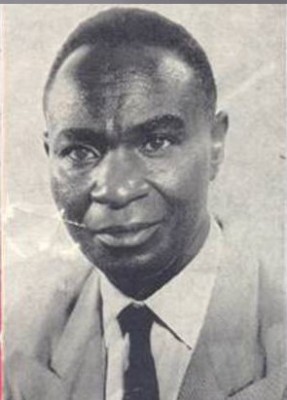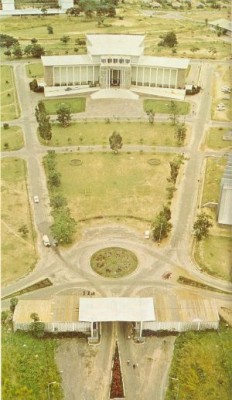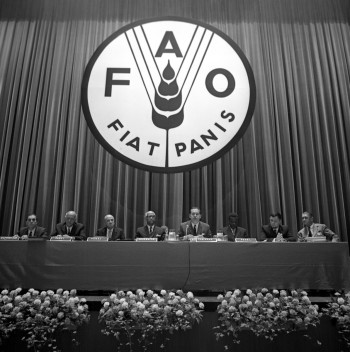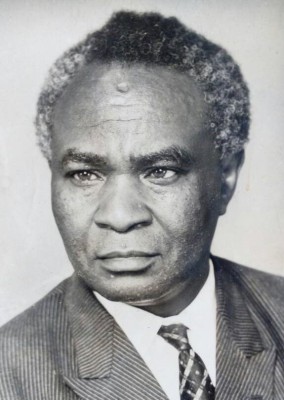John Kabwimukya Babiiha (1913-82)
A national leader and veterinary scientist from Tooro

There is some controversy over the legacy of John Kabwimukya Babiiha (JKB), Vice President in the government of the Uganda People’s Congress (UPC) of the 1960s. In Tooro, JKB is regarded as a villain for his alleged role in the establishment and expansion of prisons in the area. Some argue that JKB thus did not leave behind a credible legacy upon which contemporary leaders could marshal their inspiration. The second contention against JKB’s legacy is linked to his close association with Milton Obote, who deposed the Kabaka of Buganda and abolished ethnic federalism. On this account, JKB would pass for a sell-out by ethnic royalists in Tooro. The impact of his inclination is manifest in the confines of his appointment as a mere ‘Assistant Treasurer’ in the kingdom, despite his academic qualifications and professionalism that were second to none at that time.
Ultimately, JKB represented a response that set its parameters outside of the colonial structure of indirect rule. As a consequence, there is hardly any significant memorabilia in Tooro upon which JKB’s works can be testified, even though there are streets named after him in Kampala and his native town of Fort Portal, the capital city of Tooro region.
Born into Tooro society
JKB was born on 17 April 1913 at Burungu village, Burahya County, in Tooro, Western Uganda. He was a Muyaga by clan, with his sixth great grandfather, Kyanku Ruhundanjwenge, descended from Harutoma, the traditional Headquarters of Mihingo in Buyaga. His father was Zacharia Kubangisa and his mother Elizabeth Karungi Tibananuka, who was originally from present-day Kitagwenda County.
Many of the names at the time in Bunyoro and Tooro were associated with circumstances and themes around a child's birth. These names were allusive, and their understanding demands some knowledge of the web of thought, imagery and metaphor, which gives vitality to Rutooro. Shortly after a child is born in Tooro, a simple ceremony takes place in which he/she is given personal names together with one of the twelve traditional praise names or empaako. JKB was named Babiiha (an abbreviation of Babiihangaro) meaning ‘the hands have been deceived’. This was because all the three preceding children had died during or after childbirth. The name Kabwimukya means ‘it is raised again’. This was after the mother’s observation that if this boy Babiihangaro does not die, he will raise the ground (Kwimukya obutaka). Hence the birth of the child who was being named reminded the parents of the grief they experienced at the death of an earlier child. As for empaako, he was given Apuuli. The empaako are of Nilotic origin and only occur in Bunyoro and Tooro. Their use implies a combination of intimacy and respect.
In the pre-colonial period, Bunyoro-kitara kingdom, from which Tooro ceded, spread from Bulega in the present day Democratic Republic of Congo (DRC) to Karagwe in Tanzania and further on to Burundi. Some of the members of the lineage of Kyanku Ruhundanjwenge, namely Zachariah Kubangisa, son of Kamihanda, son of Katabarwa, son of Mulindwa, and son of Bitagase, migrated from Harutoma and moved to Mboga, which was one of the twenty-one counties of Bunyoro-kitara near the former Belgian Congo border. At that time, his grandfather Mulindwa was in the Ekikweya division of the Abarusura under the Ekirwana division whose General was Ireeta, son of Byangombe whose capital was at Kayera in Butuku. Ireeta had been given the charge of guarding the Mboga and Bulega border. As a young man, Zachariah Kubangisa, like his father Zachariah, moved to Burahya County of Tooro and settled in Burungu around 1911.
Around 1920, Kubangisa passed on and the toddler JKB, who was an only child, was left to his mother to bring him up alone. To assist her in this regard, Kubangisa's cousin, Isaac Kwirikagira, who was based in Kibimba, Kagote village took on JKB and raised him up as his own son. In the same neighborhood were JKB's cousins late Eriya Byaruhanga, Joseph Bwana and Maliko Kyomya.
Missionary connections

Initially, JKB was baptized in the Anglican Church and given a name of Jonathan Babiiha but when he was between eight and ten years, a White Father Missionary priest called Pere Bosch converted him to the Roman Catholic Church that from then on undertook to educate him. According to the popular narrative, JKB was grazing his uncle’s goats along Saaka Road, when a Muzungu (white man) named Pere Bosch came past on a motorcycle. Babiiha tried to stop him but Pere Bosch continued. Later Bosch returned, curious to know why this small boy was calling him and Babiiha went on his knees requesting Pere Bosch to take him to school. Pere Bosch discussed this with Isaac Kwirikagira (who worked as a clerk at Kabarole hospital) and Isaac gave Pere Bosch responsibility for JKB’s education. Pere Bosch took JKB to Virika and re-baptized him John Kabwimukya Babiiha.
The Catholic Missionaries had, by 1894, obtained permission from the Protectorate government to open up missions and then schools. JKB went to St. Peters and Paul Primary School in Virika from around 1918 to 1927. He then joined St. Leo’s College, Kyegobe for secondary education from 1927 to 1930. From there, he joined St. Joseph’s College, Mbarara from 1931-1932 and St. Mary’s College, Kisubi from 1932 to 1933. It is said that JKB studied in Catholic Mission schools only given that the White Fathers sponsored him. His grandson, Kato Babiiha says that their mother, Florence Kabatooro Babiiha, described their grandfather, JKB, as extremely intelligent.
Worldly qualifications
JKB joined Makerere University College, where he pursued a Diploma in Veterinary Science between 1933 and 1938. He later attended courses in the United States, including Forestry and Farm economics at West Virginia University, Veterinary Medicine at Iowa University of Science and Technology, Agriculture and Livestock at Nebraska State University in Lincoln, Veterinary Preventive Medicine at Colorado State University at Fort Collins, and Livestock Industry at Cornell University. He was also awarded a certificate of recognition from the Washington State department of Agriculture and an honorary fellowship by Lovanium University in Kinshasa (currently University of Kinshasa), DRC in 1966, together with Julius Nyerere and Kenneth Kaunda.

JKB went to the University of South Africa (external division) in Pretoria from 1950 to 1953 where he attained a Bachelor of Arts Degree in Social Anthropology. While there JKB researched ‘The Bagaya clan of Western Uganda’. In this study, JKB described the origins, behaviours and rites of the Bagaya clan leaders and their ritual significance. In 1956 JKB went to Westminster Parliamentary Institute in London where he pursued a Diploma in Parliamentary Procedure and Practice for Commonwealth citizens.
JKB received a number of awards both in politics and in his field of Veterinary science. These included a medal from Pope Paul VI in St. Peters’ Basilica Rome in 1967, when he led a Ugandan delegation to the session of Food and Agriculture Organization of the United Nations in Rome. In 1968, JKB received an award of Coronet or Omujwarakondo of Bunyoro Kitatra, said to be the highest award of all, from the last king (Omukama) of Bunyoro-kitara, Sir. Tito G. Winyi IV.
Family life

Following his graduation from Makerere, JKB married Kabahuma Elizabeth of Barungu clan in 1940. Elizabeth’s father was Placido Ndabitungiraha who was a Catechist in the Catholic Church while her mother was Mariam. She moved with JKB when he served in different districts and regions as a veterinary officer, before he joined active politics.
The couple had twelve children, many of whom pursued ambitious careers in teaching, Law and architecture. During the 1950s, Elizabeth K. Babiiha was actively involved in women’s groups in Tooro. Her role was to train young ladies in weaving, cooking and other family etiquettes as the tradition was in Tooro. ‘This was a great role and contribution to the community by our mother’, said daughter Stella Babiiha. When JKB was campaigning, his wife would travel with him as a strong supporter of UPC. Tragically, in 1979 Kabahuma Elizabeth Babiiha had a stroke. Although she recovered, she was left disabled and was never herself again.
John Babiiha died on 5 February 1982 at Rubaga hospital. At the time of his death, Babiiha was the National Chairman of the UPC, an office he held for more than one term. Babiiha is known to have loved extensive reading and research. He had a study room where he would sit and read for long hours and, besides his official schedules, he visited schools in Tooro and other parts of the country to check on academic performance. While Babiiha is accused of establishing and expanding Katojo prison (popularly known as the University of understanding), little is known about how the current University of knowledge project at Mountains of the Moon University benefited from Babiiha's alleged prison land expansion. More than half of the land on which Mountains of the Moon University is seated around Lake Saaka was carved out of the Katojo prison land. It thus goes without saying that both in life and death Babiiha should be credited as a promoter of knowledge production through reading and research.
Acknowledgements
The authors would like to thank Prof. Edward Rugumayo, the Chancellor of Mountains of the Moon University and leader of Tooro elders Forum (Isaazi ly’abantu bakuru ba Tooro), French Institute for Research in Africa (IFRA-Nairobi) & British Institute in Eastern Africa (BIEA)
Primary sources
- Interviews with Stella Babiiha, Peter Babiiha, Kato Philip and other relatives of John Babiiha
- Documents from family collection
- Uganda National Records Centre and Archives
- Kabarole District Archives
- Uganda Argus
Further reading
- Tumwine Jesse, Social and Economic History of Toro Kingdom during the Period 1830-1962 (GRIN Verlag, 2020).
- John W. Nyakatura and Teopista Muganwa, Anatomy of an African Kingdom: A History of Bunyoro-Kitara (Anchor Press, 1973).
- Jonathon Earle and J. J. Carney, Contesting Catholics: Benedicto Kiwanuka and the Birth of Postcolonial Uganda (Boydell & Brewer, 2021).
- ABK. Kasozi, The Bitter Bread of Exile. The financial problems of Sir. Edward Mutesa II during his final exile, 1966-1969, Kampala: Progressive Publishing House, 2013.
- Evarist Ngabirano, “Beyond Ethnic Patriotism: A Case Study of Toro and Kigezi Districts in Uganda”, (PhD Thesis, Kampala: Makerere University, 2020), http://makir.mak.ac.ug/handle/10570/8118
- Evarist Ngabirano, “Beyond local government reforms: A case study of Toro and Kigezi districts in the politics of post-colonial Uganda” Nationalism and Ethnic Politics, (2021), DOI: 10.1080/13537113.2021.1990704
- Yahya Sseremba, The Making and Remaking of “Native Tribes” in Uganda’s Toro Kingdom, Nationalism and Ethnic Politics, 25: 3, (2019): 311-328, DOI: 10.1080/13537113.2019.1639429
- Yahya Sseremba, Ethnic emancipation and conflict escalation in Uganda, Third World Quarterly, 41:12, (2020): 2030-2047, DOI: 10.1080/01436597.2020.1803059
- Emmanuel Kajubu, “Babiiha Family Struggling to Survive, A wait Benefits”, Uganda Radio Network (URN), 13 June 2014, https://ugandaradionetwork.com/story/babiiha-family-struggling-to-survive-await-benefits
- Uganda: Building Of A Nation: 148 Shapers and Movers of Uganda: Past and Present, New Vision Group, 2012.


